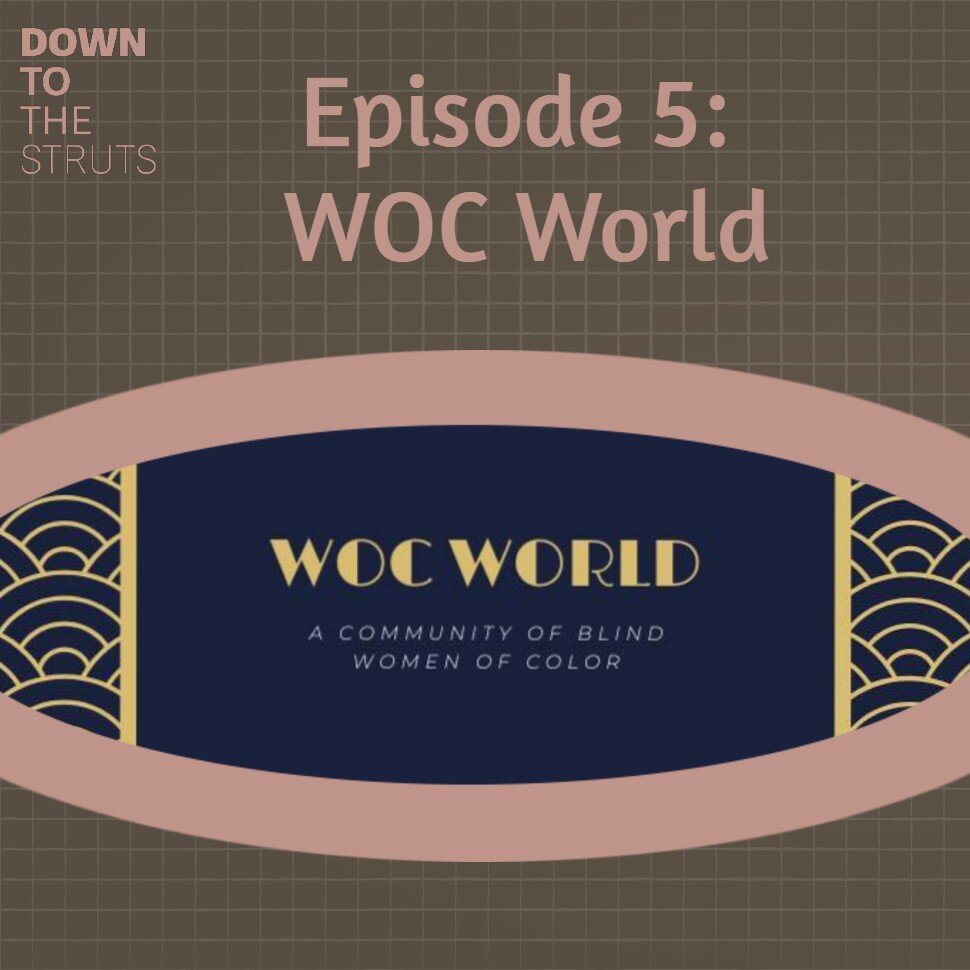Episode 5: WOC World
While earlier episodes of Down to the Struts have focused on how to design a more inclusive world at large, this interview looks inward, at how disabled people design and build our own spaces.
Justice Shorter, Melissa Lomax, and Conchita Hernandez Legorreta are the founders of WOC World: A Virtual Community for Blind Women of Color. Driven by their values of collective leadership, disability justice, and mutual aid, they have created an active community of support, mentorship, and love for blind women of color.
In this episode, Justice, Melissa, Conchita, and Qudsiya discuss navigating the world as people with multiple marginalized identities, why spaces like WOC World are revolutionary and transformative, the importance of diversity and inclusion in mentorship, and what they hope to achieve through this community.
This episode is dedicated to disabled women of color everywhere. Know that you are seen, believe that you are beautiful and perfect, and remember that you are loved.
Transcript available here.
Links:
WOC World
Fashionably Tardy
Precious Perez - Valiente
Video: The Origin of the phrase "Women of Color"
Guest bios:
Maria (Conchita) Hernandez Legorreta was born in Mexico and grew up in California. She advocates for the rights of blind children and their parents in the public-school setting in the United States and abroad through a lens of intersectionality focusing on social justice. Conchita received her Bachelor's degree from Saint Mary’s College of California, majoring in International Studies, Spanish, and History. She then went on to Louisiana Tech University where she received her Master’s in Teaching with a focus on teaching blind students. As well, Conchita earned a master’s certificate in working with Deaf-Blind students from Northern Illinois University. She is currently a Doctoral student at George Washington University pursuing a degree in Special Education. Conchita has been published in Future Reflections and Rooted in Rights. Conchita keeps up with research in special education and serves as a peer reviewer on the Journal of Blindness Innovation and Research. Conchita conducts workshops on best practices for educators and professionals in the field of disability and advocacy in the United States and internationally. Conchita worked in the rehabilitation field in Nebraska where she set up innovative programming for disabled adults. Conchita is the founder and Chair of METAS (Mentoring Engaging and Teaching All Students) a non-profit organization that trains educators in Latin America that work with blind/low vision students and other disabilities. In this role she engages lawmakers in policy discussions around people with disabilities and inclusion. Conchita is also a co-founder of the National Coalition of Latinx with Disabilities that seeks to amplify the voices of disabled Latinx in the disability rights movement. Currently, Conchita works as the Maryland Blind and Low Vision Specialist. Conchita strives to be a voice for change for educators, professionals and advocates to make full inclusion a reality for people with disabilities in Latin America.
Justice Shorter is a Disability Justice advocate and Black Disabled Lives Matter amplifier. She is a national expert on disability inclusive disaster protections, emergency management and humanitarian crises/conflicts. As a youth journalist in 2005, Justice began writing professionally on topics related to community development, humanitarian affairs and youth empowerment. Driven to action by these issues, she has studied community development in South Africa, Peace & Post-Conflict Reconciliation in Uganda/Rwanda, periodically returned to her childhood community to teach on subjects surrounding social action/communications and earned a B.A. in Journalism with minors in Justice & Peace Studies from Marquette University.
While earning her MA in Sustainable Development: International Policy & Management, Justice authored three separate inclusion guides for the U.S. State Department and produced multiple people-centered projects via internships with The Hunger Project, World Learning and Women Enabled International. Justice also interned within the White House Office of Public Engagement & Intergovernmental Affairs where she focused on disability outreach efforts, social inclusion policies and federal agency engagement.
In more recent years, Justice served as a Disability Integration Advisor with the U.S. Federal Emergency Management Agency, deploying frequently to disaster areas across America and its territories. She is also the co-creator of a celebrated framework for applying Disability Justice approaches to disaster assistance, an Emergency Management method that acknowledges histories of harm, centers intersectionality and prioritizes leadership by Black, Indigenous & People Of Color with disabilities. With a steadfast commitment to international development and inclusive humanitarian assistance, Justice continues to participate in ongoing projects as a global advisor and trainer.
Melissa Lomax is dedicated to strengthening communities and empowering youth. She has spent six years developing and managing programs, mentoring, and providing college and career advice for blind youth. For over 10 years, she has focused on advocating for disabled persons nationally and internationally. She wishes to share the message that disabled people can and do make large contributions to society and should not be overlooked. As co-founder of the Fashionably Tardy Podcast, she uses her advocacy and storytelling skills to create a space where disabled and non-disabled professionals can connect over shared experiences. Lissa also continues her dedication to empowering the disability community as a co-founder of WOC World: A Virtual Space for Blind Women of Color. She likewise uses her platform as a career advisor to promote body positivity, style exploration, self-confidence, and self-love through a series of workshops she designed for high school and college students interested in fashion and appearance.



